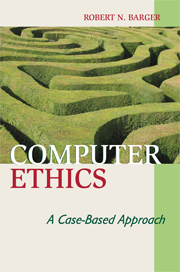Book contents
- Frontmatter
- Contents
- Preface
- Acknowledgments
- 1 Introduction
- 2 The Computer as a Humanizing Agent
- 3 Philosophic Belief Systems
- 4 A Philosophic Inventory
- 5 The Possibility of a Unifying Ethical Theory
- 6 The Ethical Decision-Making Process
- 7 Psychology and Computer Ethics
- 8 The Computing Field as a Profession
- 9 Computer-Related Codes of Ethics
- 10 Computer Ethics and International Development
- 11 Robotics and Ethics
- 12 Theft and Piracy Concerns
- 13 Cases Concerning Theft and Piracy
- 14 Privacy Concerns
- 15 Cases Concerning Privacy
- 16 Power Concerns
- 17 Cases Concerning Power
- 18 A Miscellaneous Collection of Cases
- 19 Parasitic Computing Case
- Appendix: Topics for Presentations, Discussions, and Papers
- Notes
- Selected Bibliography
- Index
2 - The Computer as a Humanizing Agent
Published online by Cambridge University Press: 05 June 2012
- Frontmatter
- Contents
- Preface
- Acknowledgments
- 1 Introduction
- 2 The Computer as a Humanizing Agent
- 3 Philosophic Belief Systems
- 4 A Philosophic Inventory
- 5 The Possibility of a Unifying Ethical Theory
- 6 The Ethical Decision-Making Process
- 7 Psychology and Computer Ethics
- 8 The Computing Field as a Profession
- 9 Computer-Related Codes of Ethics
- 10 Computer Ethics and International Development
- 11 Robotics and Ethics
- 12 Theft and Piracy Concerns
- 13 Cases Concerning Theft and Piracy
- 14 Privacy Concerns
- 15 Cases Concerning Privacy
- 16 Power Concerns
- 17 Cases Concerning Power
- 18 A Miscellaneous Collection of Cases
- 19 Parasitic Computing Case
- Appendix: Topics for Presentations, Discussions, and Papers
- Notes
- Selected Bibliography
- Index
Summary
Introduction
In many ways, ethics is concerned with authentic human development. In this regard, we will look at the different ethical systems in Chapter 3 and the topic of psychology and computer ethics in Chapter 7. Before we do that, a sketch is presented here of the relationship between computers and a humanistic view of human development.
From the beginning of time until 1980 there had only been about one million computers in existence. Even considering that the first electronic computer was produced in 1946, the exponential increase in the production of computers in the last few decades has been nothing short of incredible. It seems that the computer revolution is having an impact on our society equal to that of the Industrial Revolution.
Consider this prediction made in 1979 by Alfred Bork, a physics professor at the University of California at Irvine who has done pioneering work with educational computers: “By the year 2000 the major way of learning at all levels, and in almost all subject areas will be through the interactive use of computers.” What is it about the computer that made Professor Bork think that, within two decades, the computer would become the major instrument of learning?
I believe the reason is that, physiologically and psychologically, the computer is the most natural of human learning instruments. Consider that the computer is basically a replica of the human nervous system.
Information
- Type
- Chapter
- Information
- Computer EthicsA Case-based Approach, pp. 16 - 24Publisher: Cambridge University PressPrint publication year: 2008
